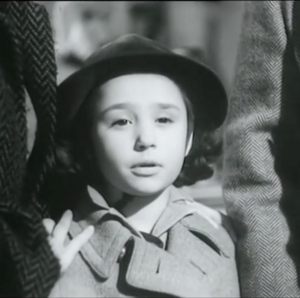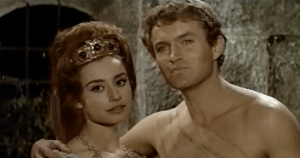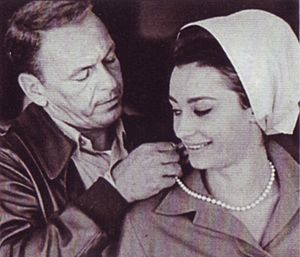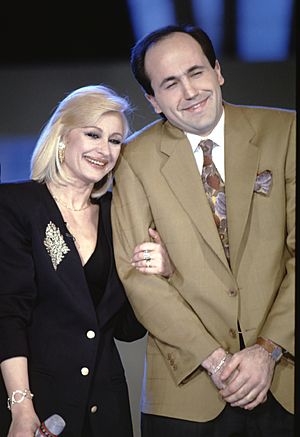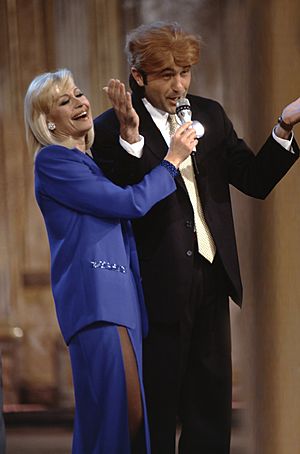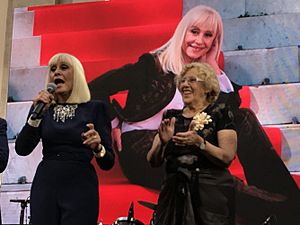Raffaella Carrà facts for kids
Quick facts for kids
Raffaella Carrà
|
|
|---|---|
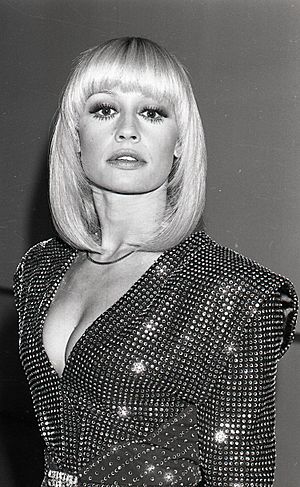 |
|
| Born |
Raffaella Maria Roberta Pelloni
18 June 1943 |
| Died | 5 July 2021 (aged 78) Rome, Italy
|
| Resting place | Porto Santo Stefano Cemetery |
| Occupation |
|
| Years active | 1952–2021 |
| Musical career | |
| Genres | |
| Instruments | Vocals |
| Labels | |
Raffaella Maria Roberta Pelloni (born June 18, 1943 – died July 5, 2021), known as Raffaella Carrà, was a famous Italian singer, dancer, TV host, actress, and model.
She became very popular in Europe and Latin America thanks to her many TV shows and hit songs. Raffaella Carrà sang well-known songs like A far l'amore comincia tu from her album Forte forte forte.
Contents
Early life and studies
Raffaella Carrà was born on June 18, 1943, in Bologna, Italy. Her parents, Raffaele Pelloni and Angela Iris Dell'Utri, separated when she was very young. Raffaella spent her childhood helping out at her mother's bar and an ice cream shop.
She loved watching TV shows and learned songs and dances by heart. When she was only eight, she moved to Rome to study at the National Academy of Dance. She later studied at the Centro Sperimentale di Cinematografia, a famous film school, and graduated in 1960.
Career highlights
Starting out: Acting and Hollywood (1950s-1960s)
When Raffaella was just nine years old, she met director Mario Bonnard in Rome. He cast her in his film Tormento del passato (1952). This was her first movie role.
She officially started her acting career in 1960 with the film Long Night in 1943. She also appeared in many Italian films, including historical movies and comedies.
In 1965, Carrà moved to Hollywood after signing a contract with 20th Century Fox. She acted alongside Frank Sinatra in the movie Von Ryan's Express (1965). She also appeared in an episode of the American TV series I Spy in 1966. However, she missed Italy and decided to return home that same year.
Back in Italy, she continued to act in films and TV shows.
How she got her famous name
In the mid-1960s, a director named Dante Guardamagna gave her the stage name Carrà. He loved painting and combined her real first name, Raffaella (which reminded him of the painter Raphael Sanzio), with the last name of another painter, Carlo Carrà.
Becoming an international star (1970s)
In 1970, Raffaella Carrà became a host for the popular Saturday night TV show Canzonissima 70 on Italian TV (RAI). She was also a dancer and actress on the show. She hosted it again in 1971 and 1974, where she released her hit song "Ma che musica Maestro".
In 1974, she co-hosted Milleluci with singer Mina Mazzini.
After becoming famous in Italy, Carrà started performing in Spain in 1975. She released an album with Spanish versions of her songs. She quickly became popular in many countries, including Spain, Germany, France, and especially Latin America.
One of her biggest hits was A far l'amore comincia tu. The English version of this song reached number nine on the UK Singles Chart. She earned many gold and platinum records around the world. In 1976, her album Forte forte forte was released in 36 countries and earned a Gold award in Canada.
TV success and new music (1980s)
In 1980, Raffaella starred in the movie Bárbara, filmed in Argentina. This was her last main role in a movie. That same year, she released the album Mi spendo tutto, which included another big hit, "Pedro".
In 1981, she hosted Millemilioni, a unique TV show filmed in five different cities: Buenos Aires, Mexico City, London, Rome, and Moscow.
From 1983 to 1985, Carrà hosted Pronto, Raffaella?, a popular midday show on Italian TV. The show was a huge success, with over 14 million viewers watching her interview with Mother Teresa. This show helped make her even more famous as a TV host.
In 1984, she was named "Female TV Personality at European Level" by European TV magazines. She also signed a big contract with a kitchen company.
In the 1985–86 TV season, she hosted Buonasera Raffaella. Some episodes were broadcast live from New York, reaching viewers across North and South America. She interviewed famous guests like Henry Kissinger and Stevie Wonder.
Hosting many shows (1990s)
In the 1990s, Raffaella Carrà focused mainly on hosting TV shows. She hosted Weekend of Rafaella and its follow-up Ricomincio da due.
In 1990, she returned to RAI to host Raffaella Venerdì, Sabato e Domenica... E saranno famosi. She also co-hosted Cuando calienta el sol, a show produced by both Italian and Spanish TV.
From 1992 to 1995, Carrà returned to Spanish TV, hosting shows like ¡Hola Raffaella! and A las 8 con Raffaella.
At the end of 1995, she came back to Italian TV with Carràmba! Che sorpresa, a show where people were surprised by meeting loved ones or celebrities. She hosted several other successful shows like Carrambà! Che fortuna and Centoventitré.
In 1997, she starred in a TV miniseries called Unamamma per caso, playing a single journalist. This was her last acting role in a TV series.
Between Spain and Italy (2000s)
In 2001, Raffaella Carrà hosted the 51st Sanremo Music Festival, a very important Italian music event.
She continued to host new seasons of Carràmba! Che sorpresa and a show called Sogni (Dreams) in 2004.
In 2006, she hosted Amore on Italian TV, a show dedicated to helping children through long-distance adoptions. This program helped arrange nearly 150,000 adoptions.
That same year, singer Tiziano Ferro released a song dedicated to her called E Raffaella è mia, and Carrà appeared in its music video.
In 2008, Spanish TV invited her to host programs related to the Eurovision Song Contest. She also hosted a new season of Carràmba! Che fortuna in Italy, which was very popular.
Later appearances (2010s)
In 2011, Italy returned to the Eurovision Song Contest, and Raffaella Carrà was chosen to host the final night from Italy. That summer, French DJ Bob Sinclar remixed her classic song A far l'amore comincia tu, renaming it Far l'amore. This remix was later used in the Oscar-winning film The Great Beauty.
From 2013 to 2016, she was a coach on the Italian version of The Voice of Italy on Rai 2, helping new singers.
In 2018, she released her last album, Ogni volta che è Natale, which included a new song called Chi l'ha detto.
In 2019, she returned to TV to host A raccontare comincia tu, a program where she interviewed famous people from entertainment, culture, and sports.
Final projects (2020s)
In 2020, a musical film called Explota Explota was released in Spanish cinemas. It was based on Raffaella Carrà's songs, and she even made a small appearance in it.
After her death in 2021, it was revealed that there were plans for her to host the Eurovision Song Contest 2022 and the Sanremo Festival again.
An icon for women and the LGBT community
Raffaella Carrà was known for being bold and breaking barriers. In 1971, while hosting Canzonissima, she wore a top that showed her belly button. This was the first time a woman showed her navel on Italian public television, and it caused a lot of discussion at the time.
She was also a strong supporter of the LGBTQ+ community. She received a "gay icon" award at the 2017 World Pride Madrid event.
Personal life and passing
Raffaella Carrà had a long relationship with TV writer Gianni Boncompagni. She later had a relationship with Sergio Japino, who was a choreographer for her shows. Even after they separated, they remained good friends and worked together. It was Sergio Japino who announced her death.
She never married and did not have children of her own, although she wanted to. Instead, she chose to support several children around the world through distance adoption.
Raffaella Carrà loved Monte Argentario in Tuscany, Italy, where she lived for many years. Her home there even inspired the title of her TV show Carràmba! Che sorpresa. She was also a big fan of the Juventus football team.
Raffaella Carrà passed away in Rome on July 5, 2021, at the age of 78, due to lung cancer. Her funeral procession passed by important places in her career, like the RAI studios. Her ashes were taken to places she loved, including Porto Santo Stefano.
Political views
In a 1977 interview, Raffaella Carrà shared that she supported communist ideas. She said she would always side with workers in any conflict between workers and business owners.
Honours and awards
- Dame of the Order of Civil Merit, Spain. (1985)
- Medal of the Order of Civil Merit, Spain. (2018)
Discography
| Title | Album details | Peak chart positions | Certifications | |
|---|---|---|---|---|
| ITA |
SPA |
|||
| Raffaella |
|
— | — | |
| Raffaella Carrà |
|
— | — | |
| Raffaella... Senzarespiro |
|
— | — | |
| Scatola a sorpresa |
|
— | — | |
| Milleluci |
|
— | — | |
| Felicità tà tà |
|
— | — |
|
| Forte forte forte |
|
— | — | |
| Fiesta |
|
— | 4 | |
|
|
— | 27 | |
| Applauso |
|
— | — | |
| Mi spendo tutto |
|
— | — | |
| Raffaella Carrà |
|
— | 19 |
|
| Raffaella Carrà 82 |
|
— | 18 |
|
| Fatalità |
|
— | — | |
| Bolero |
|
— | — | |
| Fidati! |
|
— | — | |
| Curiosità |
|
— | — | |
| Raffaella |
|
— | — | |
| Inviato speciale |
|
— | — | |
| Raffaella Carrà |
|
— | — | |
| Hola Raffaella |
|
— | — | |
| Carramba che rumba! |
|
— | — | |
| Fiesta – I grandi successi |
|
— | — | |
| Replay – The Album |
|
32 | 69 | |
| Ogni volta che è Natale |
|
11 | — | |
Filmography
| Year | Title | Role | Director | Notes |
|---|---|---|---|---|
| 1952 | Torment of the Past | Graziella | Mario Bonnard | Credited as Raffaella Pelloni |
| 1958 | Valeria ragazza poco seria | Valeria's sister | Guido Malatesta | Credited as Raffaella Pelloni |
| 1959 | Europa di notte | Herself | Alessandro Blasetti | Documentary film |
| Caterina Sforza, la leonessa di Romagna | Young woman | Giorgio Walter Chili | Uncredited | |
| 1960 | Long Night in 1943 | Ines Villani | Florestano Vancini | Credited as Raffaella Pelloni |
| Fury of the Pagans | Maritza | Guido Malatesta | Credited as Raffaella Pelloni | |
| Il peccato degli anni verdi | Diana's friend | Leopoldo Trieste | Credited as Raffaella Pelloni | |
| 1961 | Atlas in the Land of the Cyclops | Eber | Antonio Leonviola | |
| 5 marines per 100 ragazze | Mirella | Mario Mattoli | ||
| Mole Men Against the Son of Hercules | Princess Saliurà | Antonio Leonviola | ||
| 1962 | Ulysses Against the Son of Hercules | Adraste | Mario Caiano | |
| Pontius Pilate | Gessica | Gian Paolo Callegari | ||
| Caesar the Conqueror | Publia | Tanio Boccia | ||
| I Don Giovanni della Costa Azzurra | Waitress | Vittorio Sala | ||
| L'ombra di Zorro | Carmela | Joaquín Romero Marchent | ||
| 1963 | The Terrorist | Giuliana | Gianfranco de Bosio | |
| The Organizer | Bianca | Mario Monicelli | ||
| 1964 | L'amore e la chance | Lisa | Charles L. Bitsch | Segment: "Lucky la chance" |
| 1965 | La Celestina P... R... | Bruna | Carlo Lizzani | |
| Von Ryan's Express | Gabriella | Mark Robson | ||
| 1966 | Rose rosse per Angelica | Angelique | Steno | |
| Il vostro superagente Flit | Aura | Mariano Laurenti | ||
| Le Saint prend l'affût | Anita Pavone | Christian-Jaque | ||
| 1969 | 7 eroiche carogne | Sara van Kolstrom | José Luis Merino | |
| Why Did I Ever Say Yes Twice? | Teresa Coppa | Franz Antel | ||
| 1970 | Safety Catch | Alberta Radelli | Yves Boisset | |
| 1980 | Barbara | Barbara | Luigi Gregori | |
| 1983 | "FF.SS." - Cioè: "...che mi hai portato a fare sopra a Posillipo se non mi vuoi più bene?" | Herself | Renzo Arbore | Cameo appearance |
| 2013 | Colpi di fortuna | Raffaella | Neri Parenti | Segment: "Terzo episodio" |
| 2020 | My Heart Goes Boom! | Herself | Nacho Álvarez | Cameo appearance (Final film role) |
| Sources: | ||||
Television
| Year | Title | Role | Network | Notes |
|---|---|---|---|---|
| 1962–63 | Il paroliere questo sconosciuto | Herself/Co-host | Rai 2 | Variety show |
| 1964 | I grandi camaleonti | Ortensia | Rai 1 | Main role; 8 episodes |
| 1965 | Lo stagno del diavolo | Marie | Rai 1 | Television film |
| Scaramouche | Costanza De Mauriac | Rai 1 | Guest role; 2 episodes | |
| 1966 | I Spy | Sophia | NBC | Episode: "Sophia" |
| 1967 | Del vento fra i rami del sassofono | Pamela | Rai 1 | Television film |
| Tutto per bene | Palma Lori | Rai 1 | Television film | |
| 1968 | Tempo di samba | Herself/Co-host | Rai 2 | Variety show |
| Processo di famiglia | Bice | Rai 1 | Television film | |
| Idillio Villereccio | Waitress | TSI | Television film | |
| 1969 | Il sorriso della Gioconda | Doris Mead | Rai 1 | Television film |
| 1970 | Io, Agata e tu | Herself/Co-host | Rai 1 | Variety show |
| 1970–75 | Canzonissima | Herself/Host | Rai 1 | Variety/musical show (seasons 8–9, 12) |
| 1971 | Arsène Lupin | Antonina/ Carmela | France 2 | Episode: "La femme aux deux sourires" |
| 1974 | Milleluci | Herself/Co-host | Rai 1 | Variety show |
| 1976 | La hora de… Raffaella Carrà | Herself/Host | TVE1 | Variety show |
| 1977 | Ekeines… ki ego | Italian woman | Yened | Unknown episode |
| 1978 | Ma che sera | Herself/Host | Rai 1 | Variety show |
| Raffaella Show | Herself/Host | Rai 1 | Variety show | |
| 1979 | Raffaella Carrà Show | Herself/Host | RSI La 1 | Talk show |
| 1981 | Millemilioni | Herself/Host | Rai 2 | Musical program |
| 1982–83 | Fantastico | Herself/Co-host | Rai 1 | Variety show (season 3) |
| 1983 | Sanremo Music Festival 1983 | Herself/Guest | Rai 1 | Annual music festival, performing "Soli sulla luna" |
| TG1 | Herself/Guest | Rai 1 | Daily news program | |
| 1983–85 | Pronto, Raffaella? | Herself/Host | Rai 1 | Variety/game show |
| 1985–86 | Buonasera Raffaella | Herself/Host | Rai 1 | Variety show |
| 1986–87 | Domenica in | Herself/Host | Rai 1 | Information program (season 11) |
| 1987 | Benvenuta Raffaella | Herself | Canale 5 | Special |
| 1988 | Raffaella Carrà Show | Herself/Host | Canale 5 | Variety show |
| 1989 | Il principe azzurro | Herself/Host | Canale 5 | Game show |
| 1990 | Raffaella Venerdì, Sabato e Domenica – Ricomincio da due | Herself/Host | Rai 2 | Variety show |
| 1990–91 | Ricomincio da due | Herself/Host | Rai 2 | Variety show |
| 1991–92 | Fantastico | Herself/Host | Rai 1 | Variety show (season 12) |
| 1992–94 | ¡Hola Raffaella! | Herself/Host | TVE1 | Spanish version of Pronto, Raffaella? |
| 1993–94 | A las 8 con Raffaella | Herself/Host | TVE1 | Talk show |
| 1995 | En casa con Raffaella | Herself/Host | Telecinco | Variety show |
| 1995–2002 2008–09 |
Carràmba! Che sorpresa | Herself/Host | Rai 1 | Italian version of Surprise Surprise |
| 1996–97 | 40 minuti con Raffaella | Herself/Host | Rai 1 | Talk show |
| 1997 | Mamma per caso | Nicoletta Brizzi | Rai 1 | Miniseries |
| 1997–98 | Campanadas | Herself/Host | TVE1 | New Year's special |
| 1998–99 | Centoventitré | Herself/Host | Rai 1 | Game show |
| 1999 | I fantastici di Raffaella | Herself/Host | Rai 1 | Variety show |
| 2001 | Sanremo Music Festival 2001 | Herself/Host | Rai 1 | Annual music festival |
| 2004 | Contigo | Herself/Host | TVE1 | Telethon |
| Sogni | Herself/Host | Rai 1 | Reality show | |
| 2005 | Raffaella Hoy | Herself/Host | El Trece | Variety show |
| 2006 | Amore | Herself/Host | Rai 1 | Italian version of Contigo |
| 2008 | Salvemos Eurovisión | Herself/Host | La 1 | Eurovision Spanish National Final |
| 2009 | Saturday Night Live | Herself/Guest host | Cuatro | Episode: "Raffaella Carrà" |
| 2011 | Eurovision Song Contest 2011 | Herself/ Commentator | Rai 5 | Annual music festival |
| 2013–16 | The Voice of Italy | Herself/Coach | Rai 2 | Talent show (seasons 1–2, 4) |
| 2014 | Sanremo Music Festival 2014 | Herself/Guest | Rai 1 | Annual music festival |
| 2015 | Forte Forte Forte | Herself/Judge | Rai 1 | Talent show (also co-creator) |
| 2019 | A raccontare comincia tu | Herself/Host | Rai 3 | Talk show |
| Sources: | ||||
See also
 In Spanish: Raffaella Carrà para niños
In Spanish: Raffaella Carrà para niños
 | Calvin Brent |
 | Walter T. Bailey |
 | Martha Cassell Thompson |
 | Alberta Jeannette Cassell |


